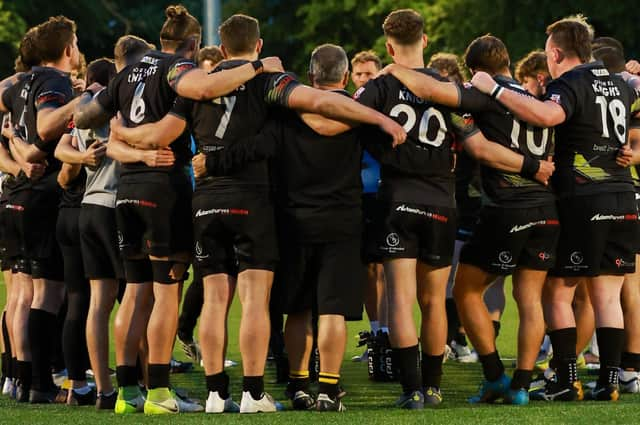Melrose advised by rugby chiefs of alternative likely fates after Southern Knights call it a day


The Greenyards outfit, along with their five rivals also granted semi-professional franchises in 2019 – Ayr, Heriot’s, Watsonians, Stirling County and Boroughmuir – were relegated from the Scottish Premiership to Scottish National League Division 1 as part of a deal agreed to pave the way for what was originally the Fosroc Super6 Championship.
Rugby officials nationwide are now being consulted on whether or not the four of those clubs currently outwith the top flight should have their premiership status restored following the Super Series being scrapped later this year.
Advertisement
Hide AdAdvertisement
Hide AdMelrose have been stuck in National 1 for the last five years, sitting fifth in the table at the moment, on 51 points from 17 fixtures, with one game of this season left to play – away to Glasgow Academicals on Saturday, March 16 – and having ended up third last year and fourth in 2022 and 2020’s coronavirus-curtailed campaign following a fourth-placed finish in the premership in 2019.
Edinburgh’s Watsonians have also failed to make it out of National 1, sitting sixth in its standings at the moment, also with one fixture left to play.
Heriot’s club side are already back in the premiership, having pipped Gala to the post for promotion by a single point in 2022, and Ayr, 18 points clear at the top of National 1, are on their way to join them whatever is decided by the Scottish Rugby Union later this month.
The last half-decade has been less kind to Stirling and Boroughmuir, with the former now in Scottish National League Division 2 following relegation last year and the latter in National 3 after back-to-back demotions in 2022 and 2023.
Advertisement
Hide AdAdvertisement
Hide AdOnly three of the sides that replaced the Super6 franchises’ club teams in the premiership are still there – Selkirk, Marr and Musselburgh – with Jed-Forest having been relegated at the end of the regular season just finished and Glasgow Hutchesons’ Aloysians and Aberdeen Grammar having made prior exits.
The three main options out for consultation are for the status quo to be maintained, though the four non-top-flight teams’ promotion prospects would be likely to be boosted by the return of at least some of their Super Series players; for the premiership to be expanded from ten to a dozen teams by the addition of Melrose and Watsonians, with Boroughmuir and Stirling taking their place in National 1 for the 2024/25 season; or for National 1 to go up to 12 teams next season, with Stirling and Boroughmuir parachuted in.
There are four other options on the table, including expanding the premiership to 22 teams, but they’re expected to be dismissed as non-starters.
A decision on which option to go with is due to be made by the Scottish Rugby Union’s club rugby board on Friday, March 15.
Advertisement
Hide AdAdvertisement
Hide AdThose proposals have been drawn up by a 15-strong focus group led by Gavin Scott, the SRU’s director of rugby development, and also including Gala’s Ian Dalgleish and former Melrose centre Graham Shiel, currently head coach at Boroughmuir Bears.
The advice given to Scott’s focus group was that their proposals should be “as fair to as many clubs as possible”, cause “least disruption to the ten-team national league structures and regional leagues” and should avoid any clubs being “seriously inconvenienced”.
Their brief also included seeking to avert potentially dangerous mismatches between sides fielding ex-pros and third or fourth-tier opposition and striving to preserve the integrity of the domestic game as best they could.
This month’s announcement of the imminent end of the Fosroc Super Series project came with a pledge of funding for Knights and their rivals to contest another championship from August onwards following April to June’s farewell Fosroc Super Series Sprint but they’re expected to call it quits in the summer instead of carrying on for such a last hurrah.
Advertisement
Hide AdAdvertisement
Hide AdThat’s yet to be confirmed but winding up then would avert the recruitment difficulties likely to be faced by some of the franchises ahead of a dead-end competition and it would also enable players to agree new club deals during the upcoming close season rather than in October or November.
Knights, now with Melrose scrum-half Douglas Crawford as general manager, and their rivals are expected to merge operations with their parent clubs after the next and last sprint but it’s not yet known how many of their former players are likely to be rejoining them.
In the meantime, Knights say they’re focusing on the fixtures ahead of them rather than the uncertain future to follow as they prepare to go the same way as pro outfit Border Reivers almost 20 years ago.
“Accepting Scottish Rugby’s decision to disband the Super Series competition as part of a newly-announced male performance pathway, Knights remain focused on preparing for the upcoming sprint season,” said a spokesperson for the Greenyards club.
Advertisement
Hide AdAdvertisement
Hide Ad“Pre-season training is well under way at the Greenyards, with a number of key players from the championship season returning to our squad.
“Boosted by the recruitment of some new emerging talent within the Borders, the squad are shaping up to be an exciting blend of youth and experience, which we look forward to seeing take the field during the sprint season.
“Although uncertainty remains surrounding the conclusion of Super Series rugby, our immediate focus is to continue to build momentum as we move closer to the beginning of the sprint season.”